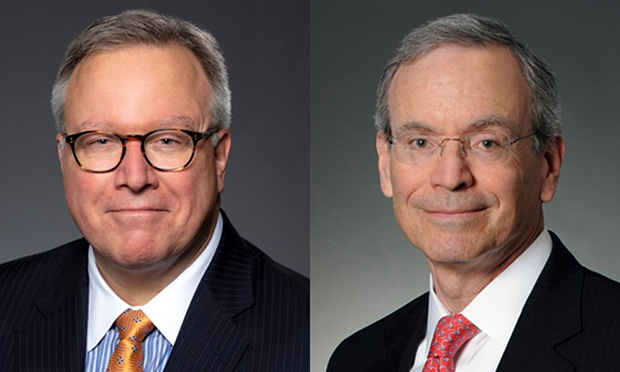Amgen Has 10 Billion Reasons to Cheer Patent Validity Ruling
Sidley Austin and Walsh Pizzi help drug maker defeat Sandoz's validity challenges to blockbuster rheumatoid arthritis drug.
August 14, 2019 at 04:51 PM
4 minute read
 ( L to R) Vernon Winters and David Pritikin, Sidley Austin partners.
( L to R) Vernon Winters and David Pritikin, Sidley Austin partners.
Amgen Inc. has won a patent infringement verdict worth $10 billion.
No damages were in play in Immunex v. Sandoz, but Amgen’s market cap popped $10 billion Monday on news that it successfully defended two patents on its rheumatoid arthritis biopharmaceutical Enbrel.
Following a two-week bench trial last fall, U.S. District Judge Claire Cecchi of the District of New Jersey entered a permanent injunction against Sandoz Inc., which has been gunning for Enbrel’s validity since 2013. Amgen rings up nearly $5 billion a year in domestic sales of Enbrel—about 20% of its U.S. revenues—and the patents still have nearly a decade to run.
So Cecchi’s 85-page opinion Thursday rejecting a host of Sandoz validity challenges was big enough to make Amgen the Stock of the Day for Investor Business Daily the following Tuesday.
It’s a huge win for Amgen’s trial team, which was headed up by San Francisco/Silicon Valley Sidley Austin partner Vernon Winters and one of the firm’s Chicago partners David Pritikin. It also included Washington, D.C., partner Jeffrey Kushan and local counsel from Walsh Pizzi O’Reilly Falanga.
Amgen CEO Robert Bradway said in a written statement that the company was pleased with the outcome. “Protecting intellectual property is critical to incentivize innovation and the large investments in research and development” needed to fully develop new medicines, he said.
Sandoz, represented by Winston & Strawn, Williams & Connolly and Gibbons, vowed to appeal to the Federal Circuit and said the parties have agreed to expedite it.
“Valid intellectual property should be respected, however, we continue to consider the patents in this case to be invalid,” said Carol Lynch, president of Sandoz US, in a written statement.
Enbrel is the first FDA-approved fusion protein, according to Cecchi’s opinion. The protein is made by combining the extracellular region of a 75 kilodalton Human Tumor Necrosis Factor receptor, known by the shorthand p75 TNFR, with a portion of IgG1 immunoglobulin. Hoffmann-La Roche filed the original applications in the 1990s but eventually licensed the invention to Amgen and its subsidiary Immunex Corp., and the FDA approved Enbrel in 1998. U.S. Patent 8,063,182, on the protein, and No. 8,063,522, on the method of manufacture, issued in 2011 and 2012 respectively.
Sandoz, which is the generic and biosimilar division of Novartis, launched its initial attack in the Northern District of California in 2013. U.S. District Judge Maxine Chesney of the Northern District of California ruled, and the Federal Circuit agreed, that it was premature, because Sandoz hadn’t yet applied for FDA approval of its competing biosimilar drug, which it calls Erelzi.
In the meantime, Kyle Bass’ Coalition for Affordable Drugs and Coherus BioSciences Inc. brought administrative validity challenges at the USPTO, but the agency declined to institute proceedings in either case.
As Sandoz closed in on FDA approval in 2016, Amgen, Immunex and Roche brought the present suit in New Jersey. Sandoz conceded infringement but argued that Amgen’s patents are invalid for written description, enablement, obviousness and obviousness-type double patenting.
Cecchi found the patents provided plenty of information that would lead a person of skill in the art to the active ingredient in Enbrel. The claim specification refers to a 1990 research article, which in turn notes that the entire nucleotide sequence of the p75 TNFR had been deposited with the National Institute of Health’s genetic sequence database.
“Because the p75 TNFR sequence and the IgG1 sequence were well known and accessible to a POSA, a reproduction of the known sequences was not required to be explicitly included in the Patents-in-Suit in order to claim a novel combination of those sequences,” Cecchi wrote.
As for obviousness, Cecchi found that Enbrel was met with praise and commercial success and that it satisfied a long-felt need. Amgen also argued that Sandoz’s copying of Enbrel pointed to non-obviousness, but Cecchi ruled that because biosimilars have to be almost identical to obtain FDA approval, copying could not be held against it.
But regardless of how that factor played out, she noted, “such finding would not have any material impact on the outcome of the Court’s obviousness analysis.”
This content has been archived. It is available through our partners, LexisNexis® and Bloomberg Law.
To view this content, please continue to their sites.
Not a Lexis Subscriber?
Subscribe Now
Not a Bloomberg Law Subscriber?
Subscribe Now
NOT FOR REPRINT
© 2025 ALM Global, LLC, All Rights Reserved. Request academic re-use from www.copyright.com. All other uses, submit a request to [email protected]. For more information visit Asset & Logo Licensing.
You Might Like
View All
Enzo BioChem Settles With NJ, Other States for $4.5M Over Health Data Breach
4 minute read
Personal Injury, Product Liability Suit Against AbbVie's CoolSculpting Returns to State Court
4 minute read
Saul Ewing Attorneys to Defend AI Pharma-Tech Company in Securities Class Action
4 minute read
Cooley Special Counsel Enters Appearance on Behalf of Drugmaker in Securities Class Action
4 minute readTrending Stories
- 1Trump Seeks Pause of Supreme Court Cases, Disavows DOJ Stance on Voting Rights Act
- 2ABC's $16M Settlement With Trump Sets Bad Precedent in Uncertain Times
- 3Law Firm Sued for Telemarketing Calls to Customers on Do Not Call Registry
- 4On The Move: Ex-Partner Returns to Lead Nelson Mullins Corporate Group, Burr & Forman Hires University GC as COO
- 5Energy Lawyers Field Client Questions as Trump Issues Executive Orders on Industry Funding, Oversight
Who Got The Work
J. Brugh Lower of Gibbons has entered an appearance for industrial equipment supplier Devco Corporation in a pending trademark infringement lawsuit. The suit, accusing the defendant of selling knock-off Graco products, was filed Dec. 18 in New Jersey District Court by Rivkin Radler on behalf of Graco Inc. and Graco Minnesota. The case, assigned to U.S. District Judge Zahid N. Quraishi, is 3:24-cv-11294, Graco Inc. et al v. Devco Corporation.
Who Got The Work
Rebecca Maller-Stein and Kent A. Yalowitz of Arnold & Porter Kaye Scholer have entered their appearances for Hanaco Venture Capital and its executives, Lior Prosor and David Frankel, in a pending securities lawsuit. The action, filed on Dec. 24 in New York Southern District Court by Zell, Aron & Co. on behalf of Goldeneye Advisors, accuses the defendants of negligently and fraudulently managing the plaintiff's $1 million investment. The case, assigned to U.S. District Judge Vernon S. Broderick, is 1:24-cv-09918, Goldeneye Advisors, LLC v. Hanaco Venture Capital, Ltd. et al.
Who Got The Work
Attorneys from A&O Shearman has stepped in as defense counsel for Toronto-Dominion Bank and other defendants in a pending securities class action. The suit, filed Dec. 11 in New York Southern District Court by Bleichmar Fonti & Auld, accuses the defendants of concealing the bank's 'pervasive' deficiencies in regards to its compliance with the Bank Secrecy Act and the quality of its anti-money laundering controls. The case, assigned to U.S. District Judge Arun Subramanian, is 1:24-cv-09445, Gonzalez v. The Toronto-Dominion Bank et al.
Who Got The Work
Crown Castle International, a Pennsylvania company providing shared communications infrastructure, has turned to Luke D. Wolf of Gordon Rees Scully Mansukhani to fend off a pending breach-of-contract lawsuit. The court action, filed Nov. 25 in Michigan Eastern District Court by Hooper Hathaway PC on behalf of The Town Residences LLC, accuses Crown Castle of failing to transfer approximately $30,000 in utility payments from T-Mobile in breach of a roof-top lease and assignment agreement. The case, assigned to U.S. District Judge Susan K. Declercq, is 2:24-cv-13131, The Town Residences LLC v. T-Mobile US, Inc. et al.
Who Got The Work
Wilfred P. Coronato and Daniel M. Schwartz of McCarter & English have stepped in as defense counsel to Electrolux Home Products Inc. in a pending product liability lawsuit. The court action, filed Nov. 26 in New York Eastern District Court by Poulos Lopiccolo PC and Nagel Rice LLP on behalf of David Stern, alleges that the defendant's refrigerators’ drawers and shelving repeatedly break and fall apart within months after purchase. The case, assigned to U.S. District Judge Joan M. Azrack, is 2:24-cv-08204, Stern v. Electrolux Home Products, Inc.
Featured Firms
Law Offices of Gary Martin Hays & Associates, P.C.
(470) 294-1674
Law Offices of Mark E. Salomone
(857) 444-6468
Smith & Hassler
(713) 739-1250






